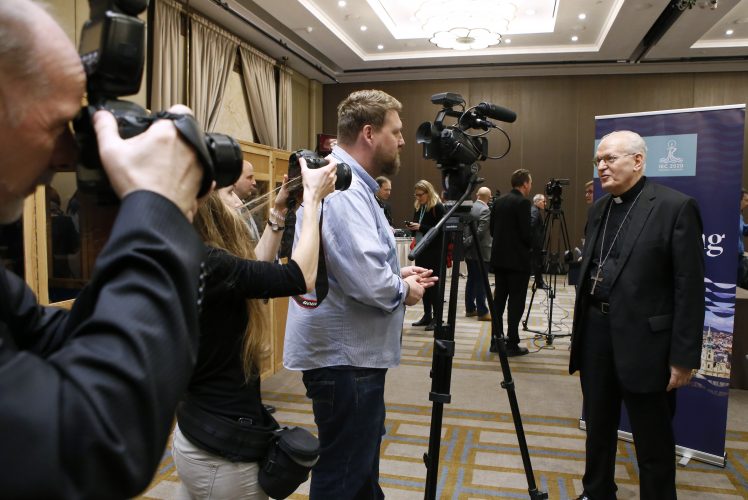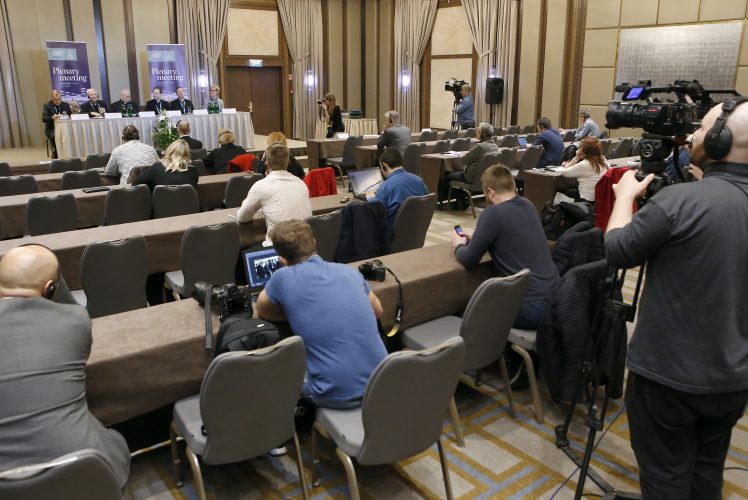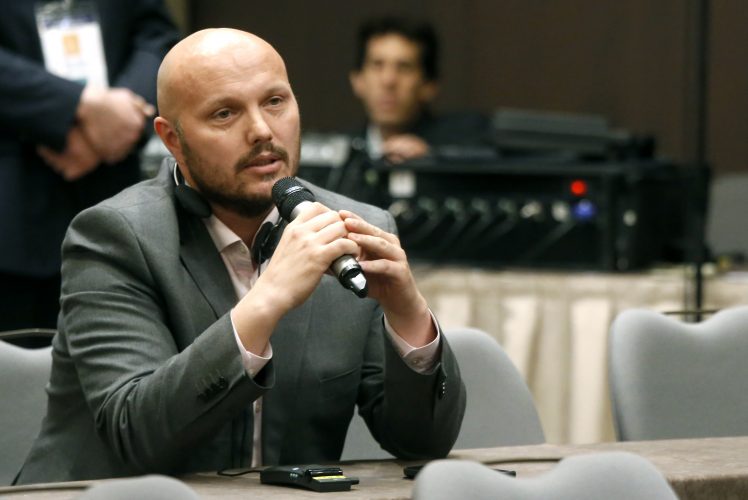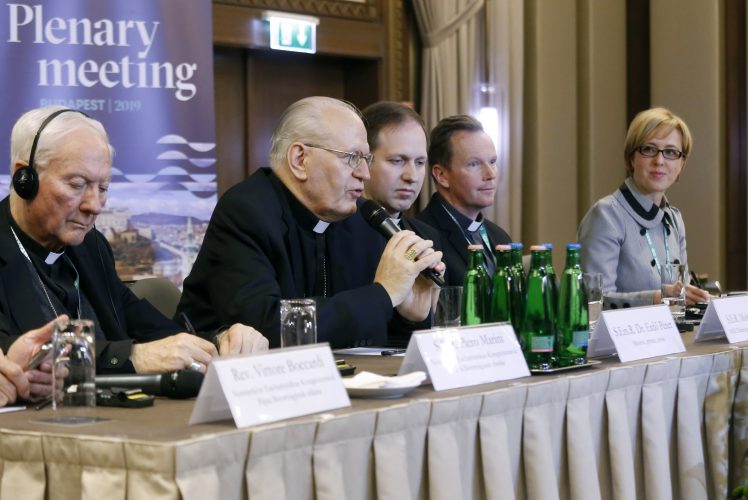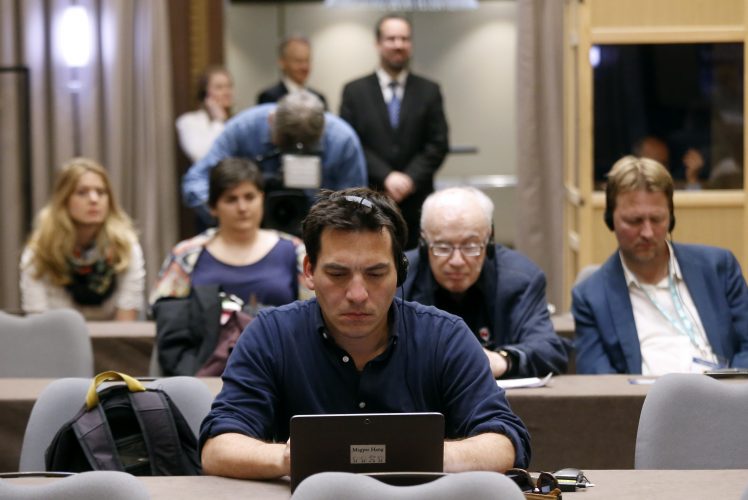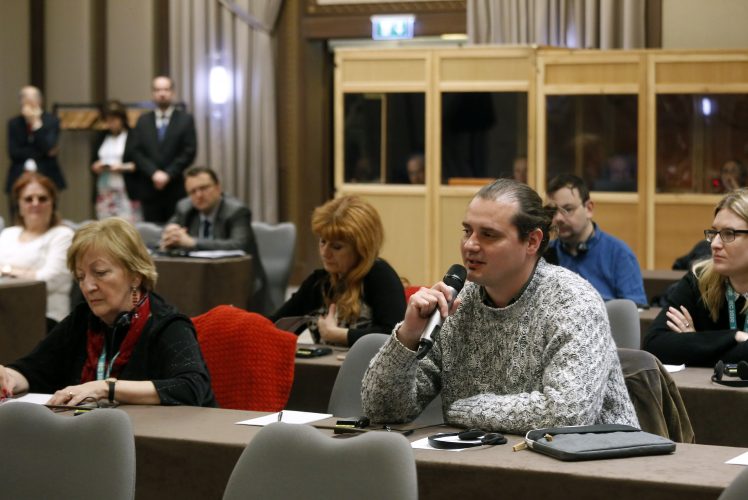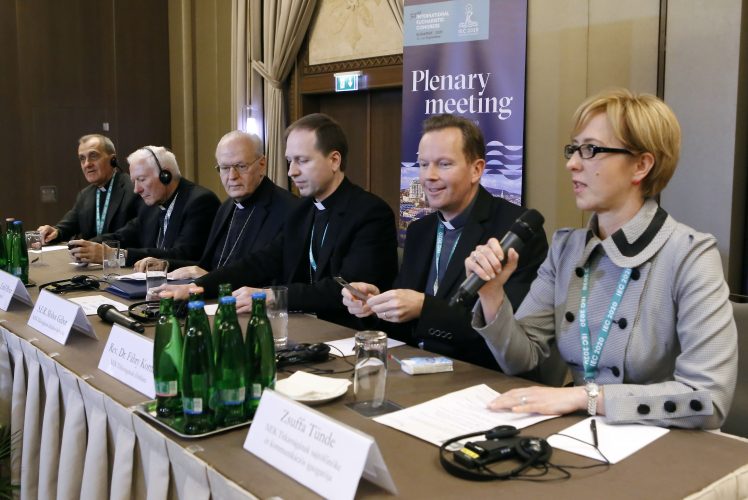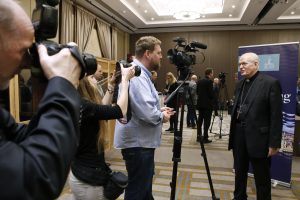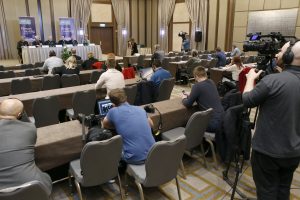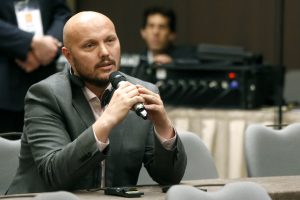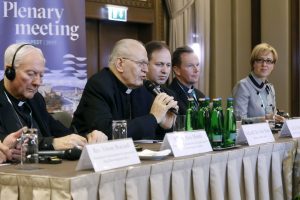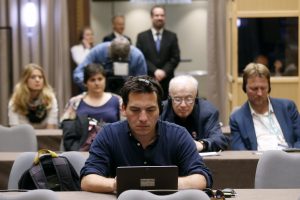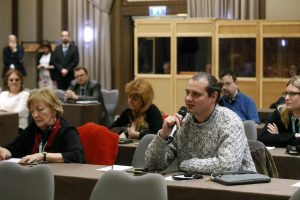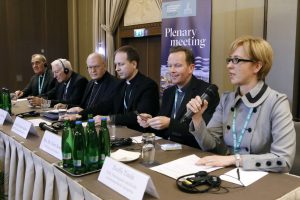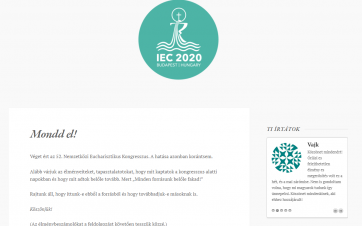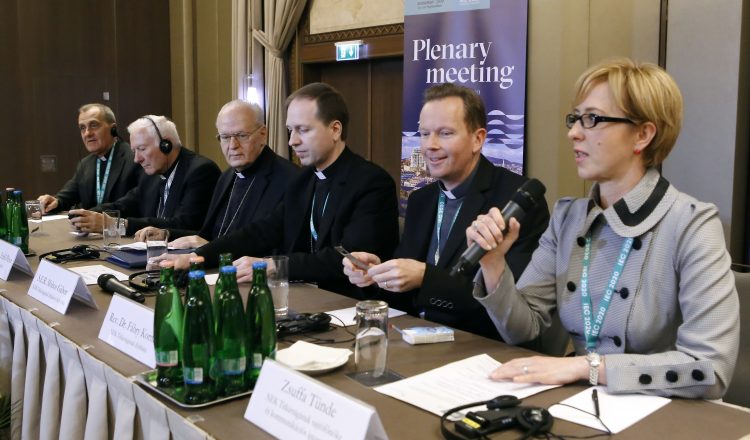
Through the spirituality of the service, towards the people

Members of the Pontifical Committee for International Eucharistic Congresses and national delegates of the Bishops’ Conferences gathered together in Budapest between the 8th and 11th of May. The results of the four-day conference were announced at a press conference in Hilton Budapest on the 10th of May. Archbishop Piero Marini, President of the Pontifical Committee for International Eucharistic Congresses, Vittore Boccardi, Secretary of the Pontifical Committee, Péter Cardinal Erdő, Primate, Archbishop of Budapest-Esztergom, Auxiliary Bishop Gábor Mohos, Kornél Fábry, Secretary General of the 2020 International Eucharistic Congress (IEC), and Tünde Zsuffa, Communications and Press Officer of the General Secretariat of IEC. Members of the Pontifical Committee for International Eucharistic Congresses and delegates of the national Bishop’s Conferences gathered from all over the world, from more than 70 countries to the Hungarian capital, Ms Zsuffa said.The guests visited the main sites of the international event to be held in Budapest.
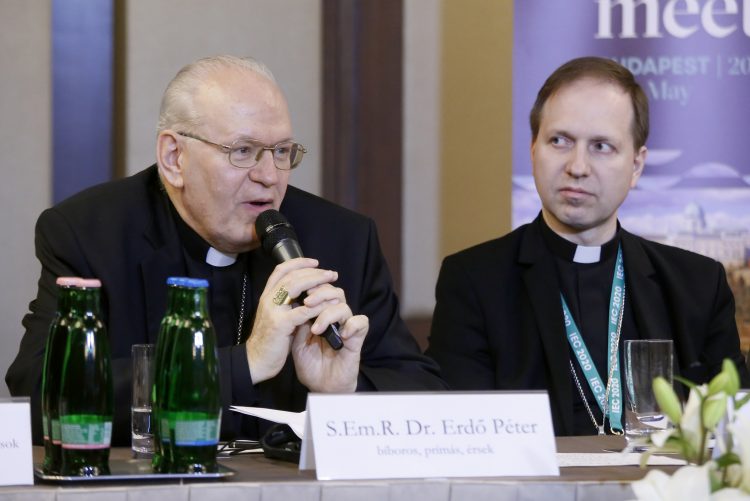
It is according to tradition and ways of the Holy See that Members of the Pontifical Committee for International Eucharistic Congresses and delegates of the respective Bishop’s Conferences responsible for the event visit the sites a year before the Congress, attend to sessions where information is distributed on the conditions of participating in the Congress, Primate Péter Cardinal Erdős told us at the press conference. This visit is on the one hand a series of religious events (holy masses, common pray, canonical hours), on the other hand an occasion to receive information about security conditions, travel conditions (especially for those who travel from faraway continents), about arrangements already completed, and the theological conference previous to the Congress. The sessions also reflected on details of registration and accommodation. The guests have visited the main venues of the international event, such as the shell of the newly constructed Puskás Stadion, the expo centre Hungexpo (venue of lectures and presentations), Heroes’ Square, Andrássy út, St.Stephen Basilica and the square in front of it, and also Kossuth tér, Péter Cardinal Erdő told the press. Guests were received by the Speaker of the Parliament László Kövér. János Áder, President of Hungary gave his speech the day before, and expressed his joy that the Hungarian capital is hosting the international event. Cardinal Erdő said: after the speech the guests asked for God’s blessing upon the President on the occasion of his 60th birthday.
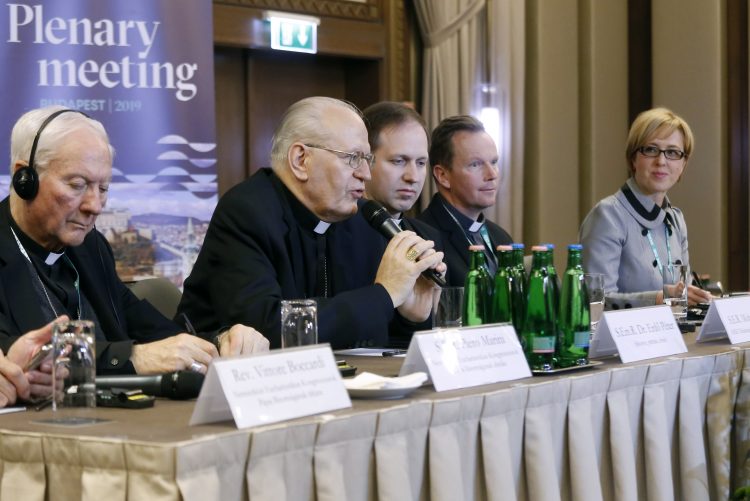
Another presentation was given by Lajos Dolhai on a theology conference on the eucharist, to be held next year; Vittore Boccardi, Secretary of the Pontifical Committee for International Eucharistic Congresses talked about the role of the secretariat in the preparations of the Congress; Archbishop Piero Marini, President of the Pontifical Committee reflected on the importance of holy masses in an ever-renewing world and also on how to reach out to the souls of people in a time when religious activities are on the mere margin of everyday life. Participants of the four-day conference are travelling to Esztergom today. Archbishop Marini stressed on the press conference that he is thankful to Péter Cardinal Erdő and the local organisers for the warm welcome, brotherly atmosphere, courtesy, the beautiful accommodation. Answering a question he also spoke about having been many times to Hungary before, feeling comfortable here and about always being glad to come here. Budapest is a city with excellent infrastructure, surely it was easy to find venues, the choice is unbelievably wide here, he added. Last time it was different: in Cebu, in the Philippines, a new building had to be constructed to host the thousands of pilgrims coming to the event. In Budapest there were no such issues. About the ways and methods of the preparations Archbishop Marini told the press: There is a Statute for organising eucharistic congresses; nations wishing to host the event can address the Presidential Council of the Pontifical Committee for International Eucharistic Congresses, the council considers the answer and the motto of the event, and the final decision needs to be approved by His Holiness. This is how the decision about Budapest was also made. During the preparations, delegates of the Bishops’s Conferences meet in Rome, where this time Péter Cardinal Erdő and the Secretary General have given their presentations. The four-day conference in Budapest is one of the final steps in the preparations. The visitors now can ascertain that the proposed sites are suitable for the purposes; also, delegated bishops receive informations crucial for the pilgrims in their respective countries: they will be facilitating travel, accommodation and registration at their dioceses.
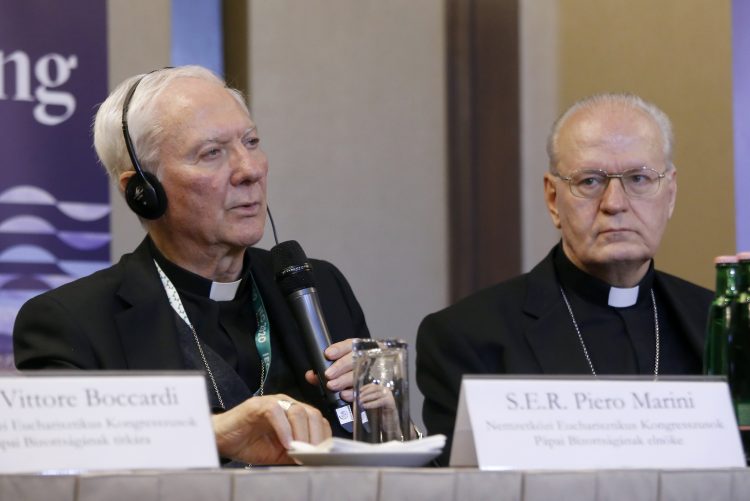
Archbishop Marini talked about the aim of eucharistic congresses. Aims change throughout history, he said. In the beginning, in the late nineteenth century many governments were against the Church, therefore back then congresses was meant to underline the presence of the Church - they were somehow a show a force towards the state. The focus was on the huge processions, where as holy masses, communion were second of importance. At these occasions the Church could reach out to the masses, as a counterpoint to the Jansenism of the time. According to Jansenism only the holy can receive communion (this is why for example Blaise Pascal could not receive the sacrament on his deathbed). As opposed to this, the Church wished to express that God is not someone instilling fear, not distant, not judging: He has a heart. Congresses served as a kind of travelling magisterium, until the birth of international days of youth or the world day of the sick. The Sacrament was carried in a royal carriage in Vienna in 1912. In the sixties, things changed. In Munich it was already tangible: it was not a show of force, but a celebration of a local community, to which many people from around the world were invited. Pius X wanted to promote the First Communion of young people, thus the aim of the Congress has changed. The expression Statio Orbis was introduced in order to draw attention to the Celebration of the Eucharist. Communion was a centrepiece of it. (More on this topic in the article of Lajos Dolhai, Rector of the Theological College of Eger, Chairman of the Theological Committee of the International Eucharistic Congress Budapest). Speaking about the message of the eucharistic congresses, Archbishop Marini pointed out: what Christians can offer in today’s world of disappointment, sorrow and war, is hope: it is Jesus, who came to serve, not to be served. We can gather in our churches on Sundays to meet Christ, belong to a community, the words of the Lord are delivered to us by the Liturgy, and we repeat the gestures of Christ. Christianity offers the spirituality of service - the Archbishop explained.
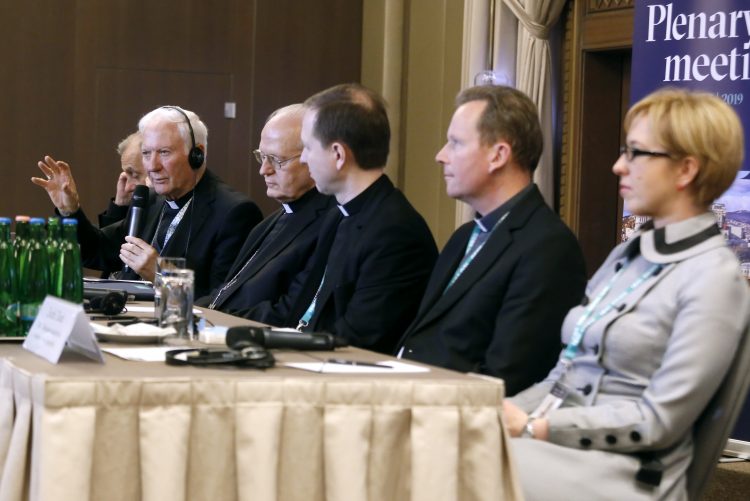
In answering the press, Archbishop Marini talked about his hopes to welcome the Pope to the Budapest Congress. He will, according to tradition, encourage him to do so, and also point out that Hungary is an important place, right in the heart of Europe: from here he could outline a future for a continent where many people has lost all hope and faith in their future.
Péter Cardinal Erdő has also elaborated on the motto of the Congress: all my fresh springs are in thee. He pointed out that its origin is Psalm 87, and it recalls Jerusalem, Jesus’ s land on Earth to us; but also the spirit of the Second Vatican Council (liturgy is “source and summit”), which leads up to the final message: to leave the church walls behind and step toward the people.
The Hungarian state firmly supports to the organisation of the congress, the press was told at the conference; and also the reconstruction of many Church buildings, forlorn and depleted since the [second world] war. There is a palpable “personal willingness” on the side of the government to warmly welcome the participants from foreign countries, Péter Erdő added.
Watch our gallery:
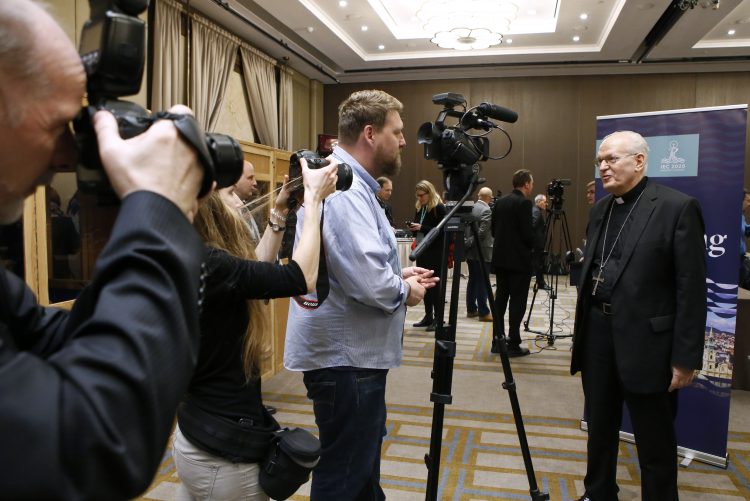
Photo: Marcsi Ambrus
